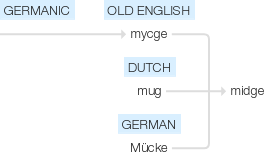Midge
Old English mycg(e), of Germanic origin; related to Dutch mug and German Mücke, from an Indo-European root shared by Latin musca and Greek muia ‘fly’.
wiktionary
From Middle English mydge, migge, from Old English mygg, myċġ(“midge, gnat”), from Proto-West Germanic *muggju, from Proto-Germanic *mugjō, from Proto-Indo-European *mū-(“fly, midge”), *mu-, *mew-.
etymonline
midge (n.)
a popular name for a tiny two-winged fly, applied indiscriminately to many small insects, Old English mygg, mycg "gnat," from Proto-Germanic *mugjon (source also of Swedish mygga, Old Saxon muggia, Middle Dutch mugghe, Dutch mug, Old High German mucka, German Mücke "midge, gnat"). No certain cognates beyond Germanic, unless doubtful Armenian mun "gnat" and Albanian mize "gnat" are counted. Watkins, Klein and others suggest an imitative root used for various humming insects and a relationship to Latin musca "fly" (see mosquito). Meaning "diminutive person" is from 1796.
